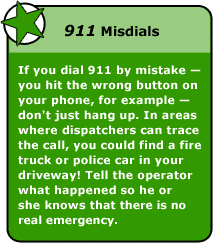911 Emergencies
 Emergencies happen when we least expect them, and they require fast thinking and action. But different emergencies call for different approaches. Here are some things to know so you'll be prepared.
Emergencies happen when we least expect them, and they require fast thinking and action. But different emergencies call for different approaches. Here are some things to know so you'll be prepared.
When to Call 911

A 911 emergency is a situation in which someone needs immediate help because he or she is injured or in immediate danger.
Call 911 if:
- there's a fire
- someone is unconscious after an accident, drinking too much, or an overdose of pills or drugs
- someone has trouble breathing, like during an asthma attack or seizure
- someone is choking
- you see a crime being committed, like a break-in, mugging, etc.
What to Say
When you call 911, the emergency dispatch operator will probably ask what, where, and who questions such as:
- "What is the emergency?" or "What happened?"
- "Where are you?" or "Where do you live?"
- "Who needs help?" or "Who is with you?"
You may feel panicky, but try to stay in control. The operator needs the answers to these questions to decide what type of emergency workers should be sent and where to send them.
Give the operator all the information you can about what the emergency is and how it happened. If someone is unconscious or has stopped breathing, the 911 operator may give you instructions for immediate help that you can provide, such as administering CPR or relieving choking if you've been trained.
Other Things to Know About 911
You know to stay calm and speak slowly and clearly so that the 911 operator can understand you. But you also need to stay on the phone and not hang up until the operator says it's OK. That way, you can be sure that the operator has all the information needed to get help to you fast. TV and the movies make it seem like operators can trace where a call is coming from, but that's not always the case.
Emergency dispatchers stress that you should never call 911 for your pets, for information, or to do routine stuff like pay a traffic ticket. Rules about 911 are strict because whenever an operator has to take a non-emergency call, it could delay getting emergency services to someone who really needs them (that's why dialing 911 as a prank is considered a crime in many places).
If you're ever in doubt and no one is around to ask, it's better to call 911 and let the operator decide if it's a real emergency than to take the chance that someone who needs help doesn't get it quickly.
When Someone's Been Hurt
Don't try to move a person who is unconscious after having an accident. He or she may have a neck or other spine injury. Call 911 or get help. If the person is not breathing and you know CPR, have someone else get help while you take care of the injured person.
If the person is bleeding, put pressure on the wound with a cloth or piece of clothing to slow the blood flow. Don't try to clean the wound, though, as it may do more damage. Wait with the person until help arrives.
Don't rush to help someone if you have to put yourself in danger — like if the victim is in the middle of a road, for example. Make sure it's safe before you try to get to the person and help.
Even if someone who's been injured is conscious, he or she may still be at risk of internal injury. In some emergencies, people seem fine at first but end up having problems later on. So it's a good idea to call 911 or take the person to the emergency department to get checked out. Someone who is disoriented, feels sick, or has a headache might have a concussion or other head injury.
Dealing with an emergency can be scary for anyone. You can take away some of the fear factor by being prepared and knowing what to do if an emergency does come up.
Reviewed by: Steven Dowshen, MD
Date reviewed: April 2013
Note: All information is for educational purposes only. For specific medical advice, diagnoses, and treatment, consult your doctor.
© 1995-2024 KidsHealth ® All rights reserved. Images provided by iStock, Getty Images, Corbis, Veer, Science Photo Library, Science Source Images, Shutterstock, and Clipart.com

